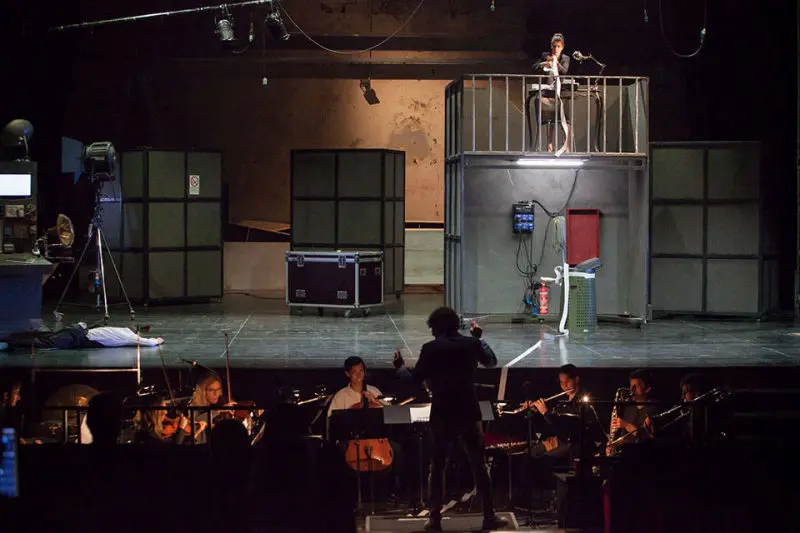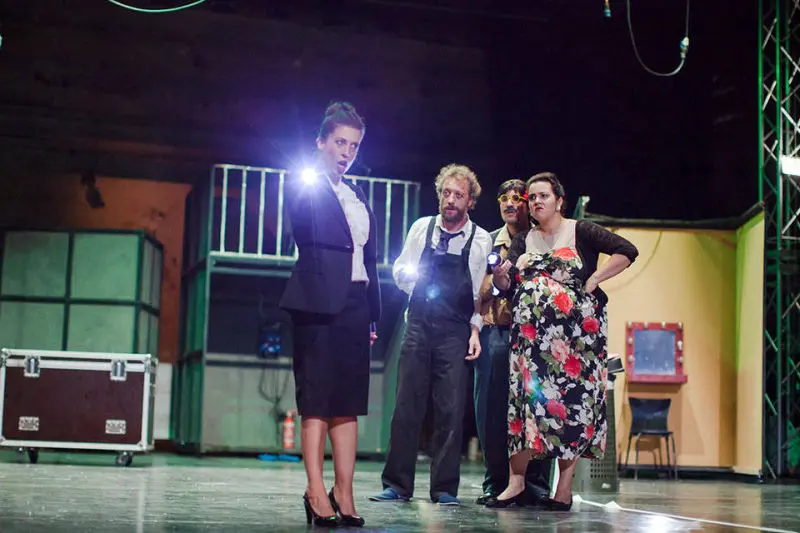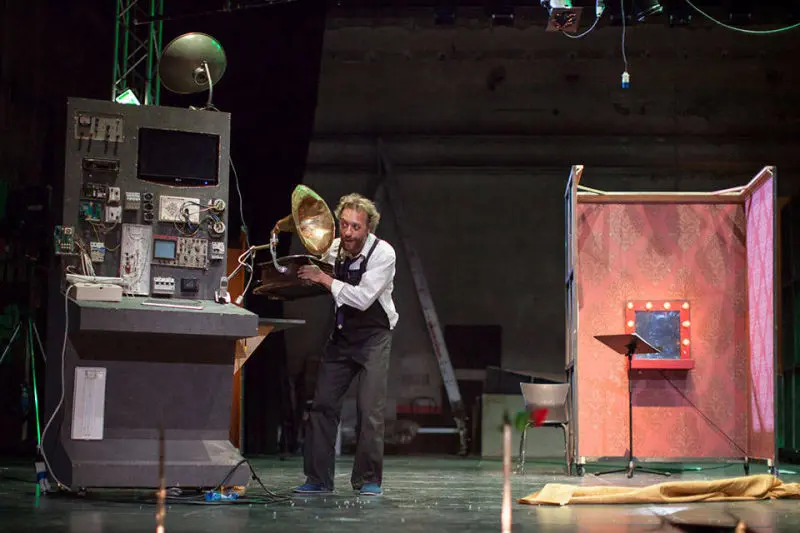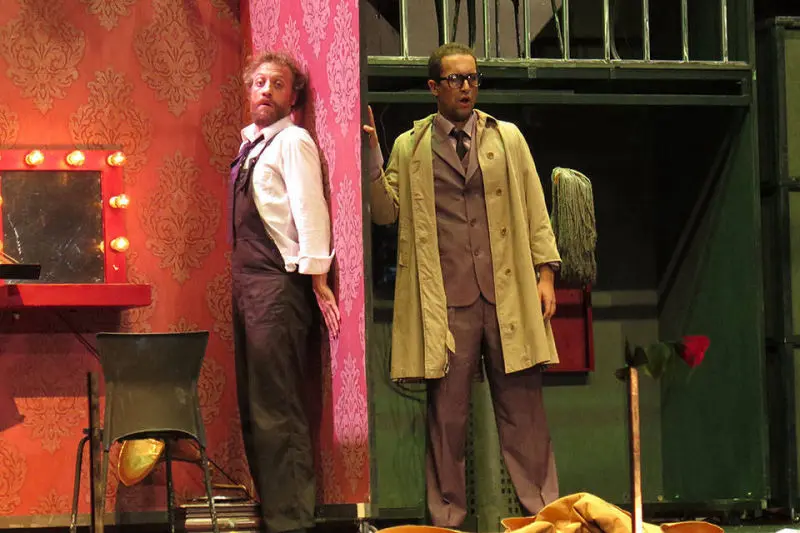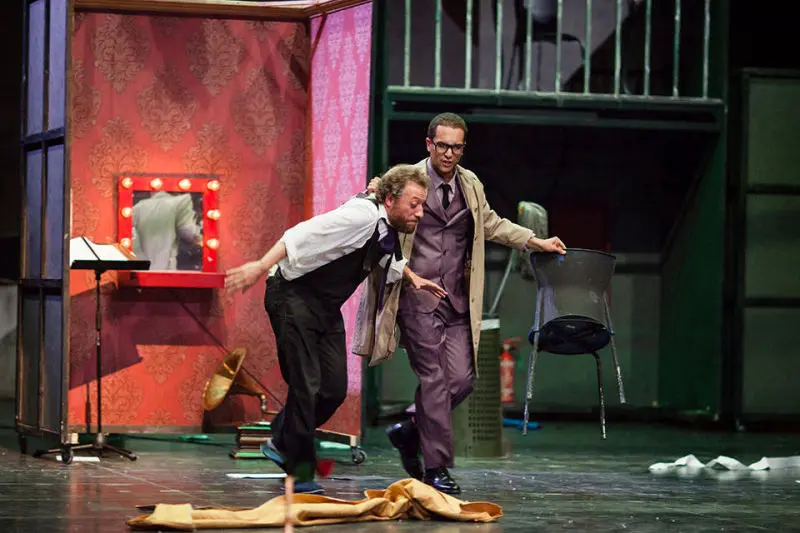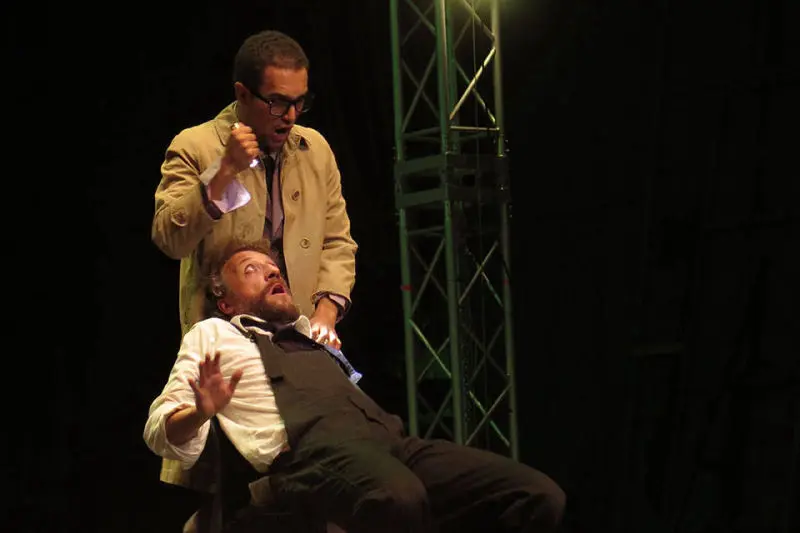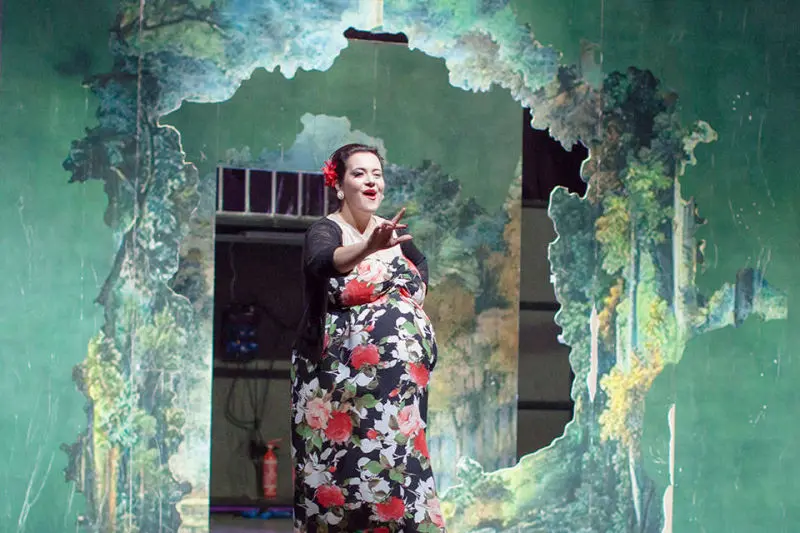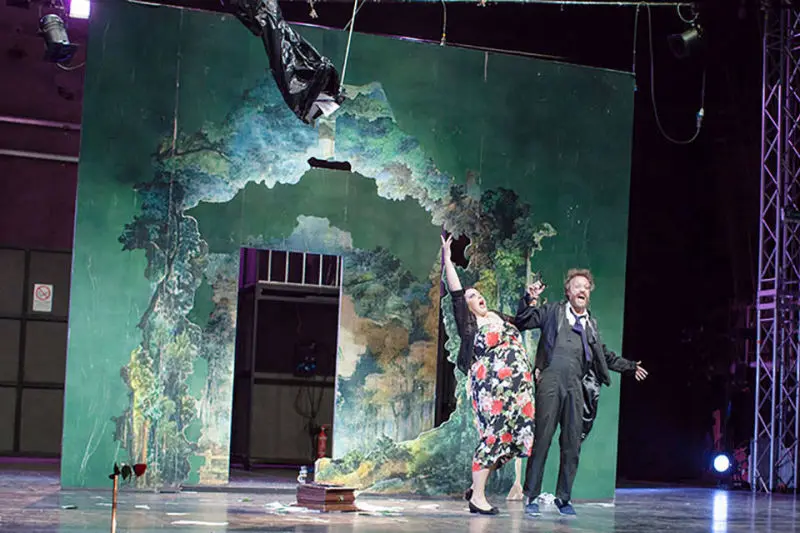IL FLAUTO TRAGICO
Opera comica in mezz'atto
(Anno 260 d.WAM.)
Music Roberto Vetrano
Libretto Stefano Simone Pintor
ARTISTIC TEAM
Stage direction Stefano Simone Pintor
Set and costume design Gregorio Zurla
Lighting design Fabio Sajiz
Video design Francesco Mori
Production La Biennale, Venezia
CAST
Gino, detto il “Pappa” Roberto Capaldo
La Direttrice Rosaria Angotti
I Tre Ginetti Roberto Capaldo
Il Divo, il tenore Matteino Principe Lucas Moreira Cardoso
La Diva, il soprano Mina Filianoti Silvia Susan Rosato Franchini
Il Commissario Straordinario dell'Antico Teatro SoleLuna Lucas Moreira Cardoso
TOUR
The production was staged at the La Biennale - Teatro Arsenale, Venice in October 2016
AWARDS
The production was selected for the Music College at the La Biennale of Venice 2016
ABSTRACT
From the example of theatrical self-irony of the film In the bleak midwinter by K. Branagh, where a shabby company of decadent actors is trying to stage a Hamlet in a deconsecrated church in order to repair their disastrous lives, with this project we looked for a title which could let us retrace the same story in the operatic field. We aimed to find a title that could be equally versatile than “Hamlet”, both devoted to tragedy and comedy: The magic flute! Loosely inspired by the numerous plots of Mozart's work, The tragic flute soon became a light metatheatrical comedy with an opera house in failure and 4 characters who inhabit it: the General Manager (light soprano), Gino called the "Pappa", the mute guardian of the theatre (actor); the Divo, the tenor Matteino Principe (actually a bass) and the Diva, the soprano Mina Filianoti (soprano). The staging of The Magic Flute in the metaphorical Antico Teatro SoleLuna became a tragedy with precarious sets, mysterious disappearances, errors and misunderstandings between the voices and the orchestra, conductor exchanges and other catastrophes. A disastrous path that, in part, retraces our daily life of artists, too often full of these kind of tragicomic events. A path that it would be better to avoid since it frequently leads us to fall inexorably but that, after all, we can not exempt ourselves from following as it is the story of our life. Because, in the end, every new step forward is just the result of an initial imbalance.
SYNOPSIS
The Antico Teatro SoleLuna is on the verge of bankruptcy. The terrible news comes to Gino called the “Pappa” (actor), the old silent theater keeper, directly from the TV news that announces the bankruptcy and then the compulsory administration of the theatre. The Director of the theater (light soprano), having also become aware of the imminent arrival of the Special Commissioner (bass), is intent on verifying and double-checking accounts and invoices. But this is not the only problem that she will have to face: in fact the electricity has been cut and almost all the artists have left the company. Only the soprano Mina Filianoti and the bass Matteino Principe, the two most elderly and presumptuous singers, remained in the theatre, ready to face the scheduled play for the evening: The Magic Flute. In order to save the fate of the theatre and be able to go on stage, the Director is ready to entrust the conduction of the show to Pappa who, besides not being a musician, is an opera lover, and who is immediately sent to the dressing room to study the score. Mina Filianoti, offended by this decision, in a fit of rage protests abandons her company. Now everything is in the hands of Matteino Principe who has got a problem: he has always thought himself as a tenor. Matteino is ready to take charge of the memorable undertaking to interpret all the roles on his own. In an attempt to impress the Director with his vocal talents, trying to sing a high F, Matteino is however caught by a stroke and dies on stage in a harrowing falsetto scream. The Director, now left alone, has nothing else to do but hiding the body before the arrival of the Special Commissioner. Meanwhile, unaware of everything, Pappa is intent on awkwardly studying solfège on the score. He is surprised, however, by the irruption in the theatre of the Special Commissioner who, in a pressing interrogation, not knowing the unfortunate custodian condition of muteness, can not extort other words from him but the monosyllable "PA". The show is about to begin and Pappa is forced to escape from the Commissioner to reach the podium from which he will conduct the orchestra. The curtain opens revealing an old torn traditional set of The Magic Flute. Pappa is intent on directing, but the Commissioner, who has meanwhile reached the audience, recognizes him and, after a daring pursuit, manages to catch him on stage. During the chase the two of them destroy the whole scene. From this disaster, however, lots of bags full of money are being revealed, as well as Mina Filianoti, who was actually unable to keep the threat and had returned to the theater, ready to sing as an absolute protagonist her air. For a moment the performance of the Diva unexpectedly solved the fate of the show. However, after a few moments, Mina is killed by a flute-gun shot fired by the Director, who in the meantime had dressed up as the orchestra's flutist in an attempt to escape the clutches of the Special Commissioner. The deception is therefore discovered: in reality, the architect of the failure of the theatre was none other than the Director who, after having let the whole company “disappear”, she tried to bankrupt the theatre in order to earn a substantial bribe from those who wanted to convert that real estate into a mega shopping center. The Director stands up and be counted and, in a delirium of omnipotence, confesses she is tired of theatre and all its artists. Also, she kills the Special Commissioner and Pappa, thus remaining alone on the scene and moving slowly away between corpses and bags of money. Darkness. Another news bulletin from the TV announces the news that, following the mysterious massacre of the Antico Teatro SoleLuna, the only survivor, formerly the Director of the theatre, is appointed Minister of Cultural Heritage for her highest repute and for the high merits achieved in the field of arts.
